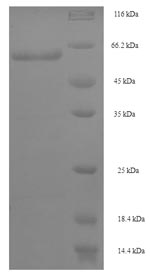Recombinant Mouse Interferon regulatory factor 8 (Irf8) is produced in E. coli and includes the complete protein sequence from amino acids 1 to 424. The protein carries an N-terminal 6xHis-SUMO tag that appears to improve both solubility and purification efficiency, reaching purity levels above 90% when verified through SDS-PAGE analysis. This high-quality recombinant protein is intended strictly for research purposes and may support a range of experimental applications.
Interferon regulatory factor 8 (Irf8) seems to play a central role in immune responses, particularly in controlling genes linked to immune cell differentiation and function. This transcription factor is likely crucial for modulating pathways in hematopoietic cells. Its influence on macrophage and dendritic cell development and function makes Irf8 activity essential for understanding immune regulation, with potentially significant implications for immunological research.
Potential Applications
Note: The applications listed below are based on what we know about this protein's biological functions, published research, and experience from experts in the field. However, we haven't fully tested all of these applications ourselves yet. We'd recommend running some preliminary tests first to make sure they work for your specific research goals.
Mouse Irf8 is a transcription factor that requires precise folding of its DNA-binding domain (N-terminal) and protein-interaction domains (C-terminal) for function. While the SUMO tag may improve solubility in E. coli, transcription factors often require specific chaperones and post-translational modifications for proper folding that bacterial systems cannot provide. The full-length protein (424aa) is complex, and the probability of correct folding for all functional domains is low. DNA-binding and protein-interaction activities cannot be assumed without validation.
1. Antibody Development and Validation
This recombinant Irf8 serves as an excellent immunogen for generating antibodies against linear epitopes. The full-length sequence ensures comprehensive coverage. The high purity minimizes antibodies against contaminants. However, antibodies may not efficiently recognize conformational epitopes on the native transcription factor.
2. Biochemical Characterization and Stability Studies
This is the essential first step to assess the protein's physical properties. Techniques like size-exclusion chromatography can determine oligomeric state and homogeneity, while circular dichroism can analyze secondary structure content and thermal stability. These studies provide critical quality control data. These analyses provide crucial data for understanding the protein's properties (not the native protein) and informing its use in other applications.
3. Tag-Based Purification Method Development
This protein is ideal for optimizing His-SUMO tag purification protocols, including testing SUMO protease cleavage efficiency and developing standardized purification workflows for related transcription factors. The well-defined protein allows systematic testing of buffer conditions and chromatography parameters.
Final Recommendation & Action Plan
The E. coli expression system is poorly suited for producing a functional full-length transcription factor like Irf8, limiting its applications to non-functional uses. The immediate priority is Application 2 (Biochemical Characterization) to assess the protein's folding state and stability. Applications 1 and 3 (Antibody Development and Purification Optimization) can proceed confidently as they don't require functional activity. Transcription factor interactions require precise tertiary structure. For functional Irf8 studies, use proteins expressed in eukaryotic systems or investigate endogenous Irf8 from cellular contexts.






